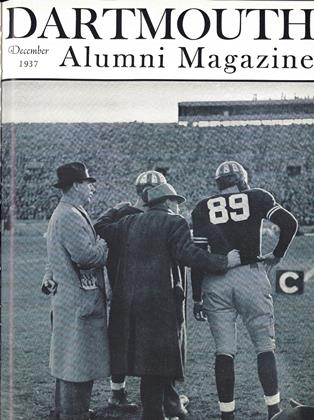They rolled on through Vermont, Maine and Virginia and came up to their first test Harvard. The sleeping Dartmouth spirit had come back with a mighty rush. In contrast to the lethargy, the indifference, even the sneering attitude of the immediate undergraduate past, the whole college turned out for the last practice before the Harvard game and wakened the welkin in the good old time way.
I was there that day, and as the Wah-Hoo-Wahs rolled out across the sunny sward, a veteran professor turned and with tears welling unbidden but unashamedly in his eyes, he said, "They may or may not give us winning football, but, thank God, they've given us back Dartmouth!"
They defeated Harvard that year 10-0. Pop Nairne skimmed a Harvard end for a touchdown and Hagerman contributed a 23-yard field goal. But they lost to Yale through a nervous start and the continual mouse-trapping of an inexperienced line. Yale marched 83 yards to score before Dartmouth could get in the ball game. After that it was a standup fight, with Dartmouth unable to break the bitter Blue defense. The Green finally did get a safety, but the ultimate score was 7-2 for the Elis.
And Cornell won with three touchdown forward passes to one for our side. And the mighty Princeton team of that year macerated us 38-13, but even so there was some balm in Gilead. The Tigers, and they were terrific that year, left the field at the half leading 32 to 0—the second highest total Princeton had ever rolled up against the Green, the highest being 42 points to none back in 1906. But Dartmouth came back after the interlude to fight the vaunted Bengals all over the field, and to score 13 points—the greatest number any Dartmouth team had ever scored in the Jungle!
It was really two football games, and, after a manner of saying, Dartmouth had "won the second one.
The inevitable post season inventories took place. There was even some criticism. Some of the goose bone prophets gave it as their opinions that the new men drove the immature Dartmouth players too hard. It was teue that their policy was drive, drive, drive. Speed was their key-note and watchword. Precision went with it. They'd been used to handling the more mature West Point Cadets, claimed their critics. Their system was too sharp and too hard for collegians. But then came the swift reaction. Since when had it been proved that Dartmouth men had gone soft? Who said a Dartmouth squad couldn't take it? That they hadn't been taking it sufficiently was proved by the scores of late years. If we were to play football, let's play it. These gentlemen didn't fool.
 View Full Issue
View Full Issue
More From This Issue
-
 Sports
SportsFollowing the Big Green Teams
December 1937 By "Whitey" Fuller '37. -
 Article
ArticleGradus Ad Parnassum
December 1937 By The Editor -
 Class Notes
Class NotesClass of 1914
December 1937 By Edward Leech -
 Class Notes
Class NotesClass of 1934
December 1937 By Martin J. Dwyer Jr. -
 Article
ArticleOld Families of Hanover
December 1937 By Eric P. Kelly 'O6 -
 Class Notes
Class NotesClass of 1935
December 1937 By William W. Titzhugh
Bill Cunningham '19
-
 Article
ArticleAND WHAT DOES IT MEAN?
December 1935 By Bill Cunningham '19 -
 Sports
SportsBig Green Teams of the New Era
December 1937 By Bill Cunningham '19 -
 Sports
SportsTHOSE GOOD OLD DAYS
December 1937 By Bill Cunningham '19 -
 Sports
SportsTHE NEBULOUS IVY LEAGUE
December 1937 By Bill Cunningham '19 -
 Books
BooksWINGS IN THE NIGHT
November 1938 By Bill Cunningham '19 -
 Article
ArticleDistinctive Student Achievement
November 1941 By BILL CUNNINGHAM '19







